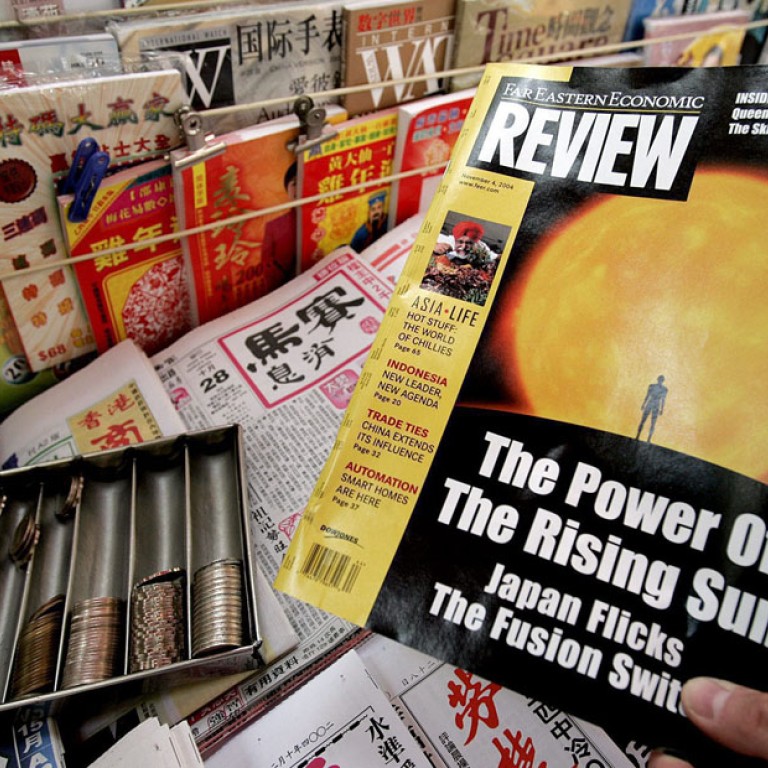
Hong Kong must remain guiding light for media amid the regional darkness
Philip Bowring says 10 years after the closure of a fearless HK publication, it's vital to maintain our freedoms and remain a hub for regional news, given the controls exerted elsewhere
This weekend about 100 journalists, myself included, from four continents have gathered in Hong Kong to celebrate the life of a once-renowned institution - the weekly magazine - that thrived in large part because of the freedoms Hong Kong provided. Those freedoms remain and need to be used to keep Hong Kong as the regional news hub.
It is a decade since the magazine was killed off by the US publisher Dow Jones. The reasons for its death, aged 58, are arguable but surely included the fact that it was in competition for revenue with , the Dow Jones flagship. New York managers' interests prevailed over local ones, in the process leaving a huge hole in Asian regional coverage that has never been filled.
At its peak in the late 1980s, the was selling 85,000 copies a week, 80 per cent of them outside Hong Kong and was eagerly awaited, sometimes in trepidation, by political leaders, business figures, academics and a large audience of English-reading professionals around Asia and beyond. It was accustomed to being banned and sued (most notably in Singapore), its correspondents harassed and occasionally jailed. But it wore these wounds with pride.
Its honesty and independence were established through its coverage of the Vietnam war, the Malaysian race riots on 1969, and the disturbances in Hong Kong both in 1966 - the Star Ferry riots - and during the Cultural Revolution.
It quickly became viewed with hostility by governments around the region, not least in Hong Kong. But here, the press remained relatively free while the situation elsewhere in the region was dire; Taiwan, Korea, Thailand, Indonesia all in the grip of authoritarian regimes, the media being gradually squeezed to death in Singapore, and muzzled in Malaysia and the Philippines.
Hong Kong's separate and peculiar existence not only helped the succeed, it also inspired other Hong Kong-based regional publications, including , and In different ways, they brought improved standards of journalism, provided independent media in countries where the local ones were controlled, and encouraged the development of a cadre of Asian journalists who would flourish in their own countries when conditions allowed.
These publications sustained the links between Hong Kong and the English-reading overseas Chinese populations in Southeast Asia, whose leading business figures always looked to Hong Kong as the ultimate refuge for money, freedom of speech and, for many from Indonesia and Burma, refuge for themselves.
None of the above publications still exist. Publishing economics have changed. The concentration of media power everywhere has driven out niche publications. Freer media in some countries has reduced the need for buying it from abroad. Meanwhile, tight restrictions remain on media in major English-reading markets such as Singapore and Malaysia. But the importance of Hong Kong as a unique regional hub remains.
Whether that advantage is fully exploited is debatable at a time when Bloomberg openly admits to tailoring news coverage to suit its commercial interests by not offending powerful people. Bloomberg is, of course, not unique among Western media, which loudly proclaim they are fearless and free but, like the sanctimonious, hypocritical , have long proved Lee Kwan Yew right when he proclaimed in the 1980s that he would hit foreign media "in their pockets" if they "interfered" in Singapore politics and they would mostly fall in line.
The business foundations of media are shifting, but Hong Kong remains the place in Asia with the best prospect of nurturing a media that is free while remaining internationalist and multi-ethnic in a region where nationalism and ethnic tensions are rising and where anti-imperialism can have a very different focus from that in 1946.
The reunion is also a reminder of the importance of records, whether of government, land ownership or family. In Hong Kong, the 58 years of Asian events recorded in the magazine can be found in the volumes in a few libraries such as that of the University of Hong Kong. But do not bother asking the owners of the copyright, Dow Jones, for the electronic version, which it has somewhere in its archives. It neither knows nor cares about such "ancient history".
If a company that proclaims itself to be a crucial source of information merely concerns itself with a few months of data, it is no surprise that the Hong Kong government continues to resist passing a law to protect its archives from the destruction that officials seem to see as the simplest way of covering up their misdeeds.
This is not just a shocking neglect of Hong Kong's own needs, condemned by its own Ombudsman and Director of Audit; it is a slap in the face of its legacy from both China and Britain, societies whose essential stability for more than 1,000 years was built on the rock of records of what went before.
Chief Executive Leung Chun-ying should ask himself how his former real estate clients would feel if records in the Land Registry were shredded, exposing all owners to Maoist jackals and hyenas.

